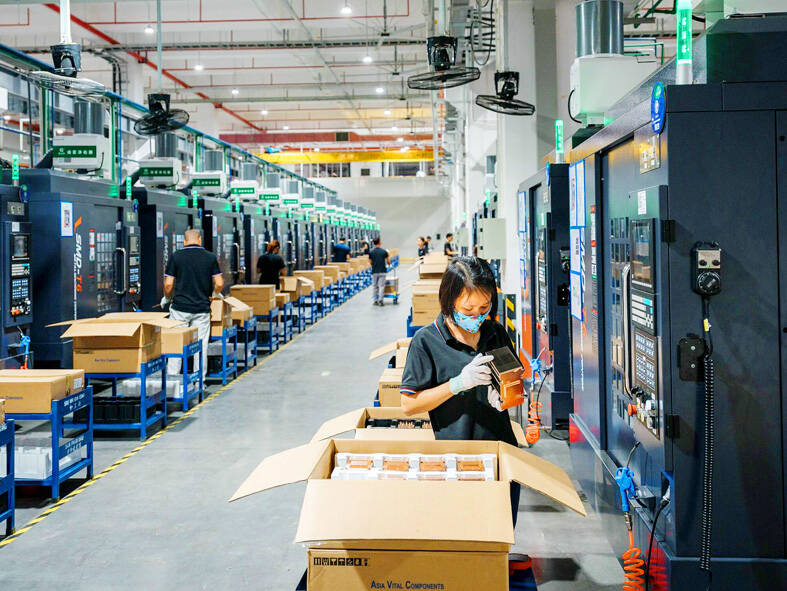Companies have been moving factories from China to Southeast Asia, anticipating that US president-elect Donald Trump would slap high tariffs on Beijing, industrial park developers in the region say.
Trump, who won a resounding victory on Tuesday, has threatened 60 percent tariffs on goods coming into the US from China, much higher than the levies of 7.5 percent to 25 percent he imposed in his first term, a major risk for the world’s second-largest economy.
Southeast Asia — with auto and electronics factories from Thailand to Vietnam and Malaysia — would likely benefit at China’s expense, said two executives, two business groups, a lawyer and an analyst in the region.

Photo: Bloomberg
Developers of industrial parks are adding Chinese speakers and preparing land tracts for factories, a sign of how Trump, who takes office in January, could reshuffle global supply chains.
As Trump geared up his campaign to retake the presidency earlier this year, calls from Chinese customers flooded WHA Group, one of Thailand’s largest industrial estate developers, company CEO Jareeporn Jarukornsakul said.
“There was (already) a relocation to Southeast Asia, but this round is going to be more intense,” she said, referring to Trump’s 2017 to 2021 first term.
WHA is expanding its sales force and adding Chinese speakers to teams overseeing maintenance and administration of industrial parks spanning more than 12,000 hectares in Thailand and Vietnam, Jareeporn said.
Of the 90 factories that have opened this year in industrial parks run across Southeast Asia by Thailand’s Amata Corp PCL, about two-thirds have been companies relocating facilities from China, company founder and chairman Vikrom Kromadit said.
Trump would be a “big punch” to China, potentially doubling the number of firms looking to move from there into Amata’s 150km² of industrial estates in four Southeast Asian countries, Vikrom said.
Construction begins this month on an Amata industrial park in Laos, where China has built a high-speed rail line connecting Kunming in southwestern China to the Laotian capital Vientiane, he said.
Thailand, a regional automobile manufacturing hub, has drawn more than US$1.4 billion in investment from Chinese automakers into its fast-expanding electric vehicle industry.
“We want a lot of investment from China so we can sell to America,” Thai Minister of Commerce Pichai Naripthaphan said.
“I believe this will happen,” he told reporters on Thursday. “The Americans love us, the Chinese love us — we don’t have to choose sides.”
Malaysia, hoping to draw more than US$100 billion in new investments to its semiconductor sector, could benefit from a realignment of supply chains, said leaders of two business groups.

Intel Corp chief executive officer Lip-Bu Tan (陳立武) is expected to meet with Taiwanese suppliers next month in conjunction with the opening of the Computex Taipei trade show, supply chain sources said on Monday. The visit, the first for Tan to Taiwan since assuming his new post last month, would be aimed at enhancing Intel’s ties with suppliers in Taiwan as he attempts to help turn around the struggling US chipmaker, the sources said. Tan is to hold a banquet to celebrate Intel’s 40-year presence in Taiwan before Computex opens on May 20 and invite dozens of Taiwanese suppliers to exchange views

Application-specific integrated circuit designer Faraday Technology Corp (智原) yesterday said that although revenue this quarter would decline 30 percent from last quarter, it retained its full-year forecast of revenue growth of 100 percent. The company attributed the quarterly drop to a slowdown in customers’ production of chips using Faraday’s advanced packaging technology. The company is still confident about its revenue growth this year, given its strong “design-win” — or the projects it won to help customers design their chips, Faraday president Steve Wang (王國雍) told an online earnings conference. “The design-win this year is better than we expected. We believe we will win

Chizuko Kimura has become the first female sushi chef in the world to win a Michelin star, fulfilling a promise she made to her dying husband to continue his legacy. The 54-year-old Japanese chef regained the Michelin star her late husband, Shunei Kimura, won three years ago for their Sushi Shunei restaurant in Paris. For Shunei Kimura, the star was a dream come true. However, the joy was short-lived. He died from cancer just three months later in June 2022. He was 65. The following year, the restaurant in the heart of Montmartre lost its star rating. Chizuko Kimura insisted that the new star is still down

While China’s leaders use their economic and political might to fight US President Donald Trump’s trade war “to the end,” its army of social media soldiers are embarking on a more humorous campaign online. Trump’s tariff blitz has seen Washington and Beijing impose eye-watering duties on imports from the other, fanning a standoff between the economic superpowers that has sparked global recession fears and sent markets into a tailspin. Trump says his policy is a response to years of being “ripped off” by other countries and aims to bring manufacturing to the US, forcing companies to employ US workers. However, China’s online warriors